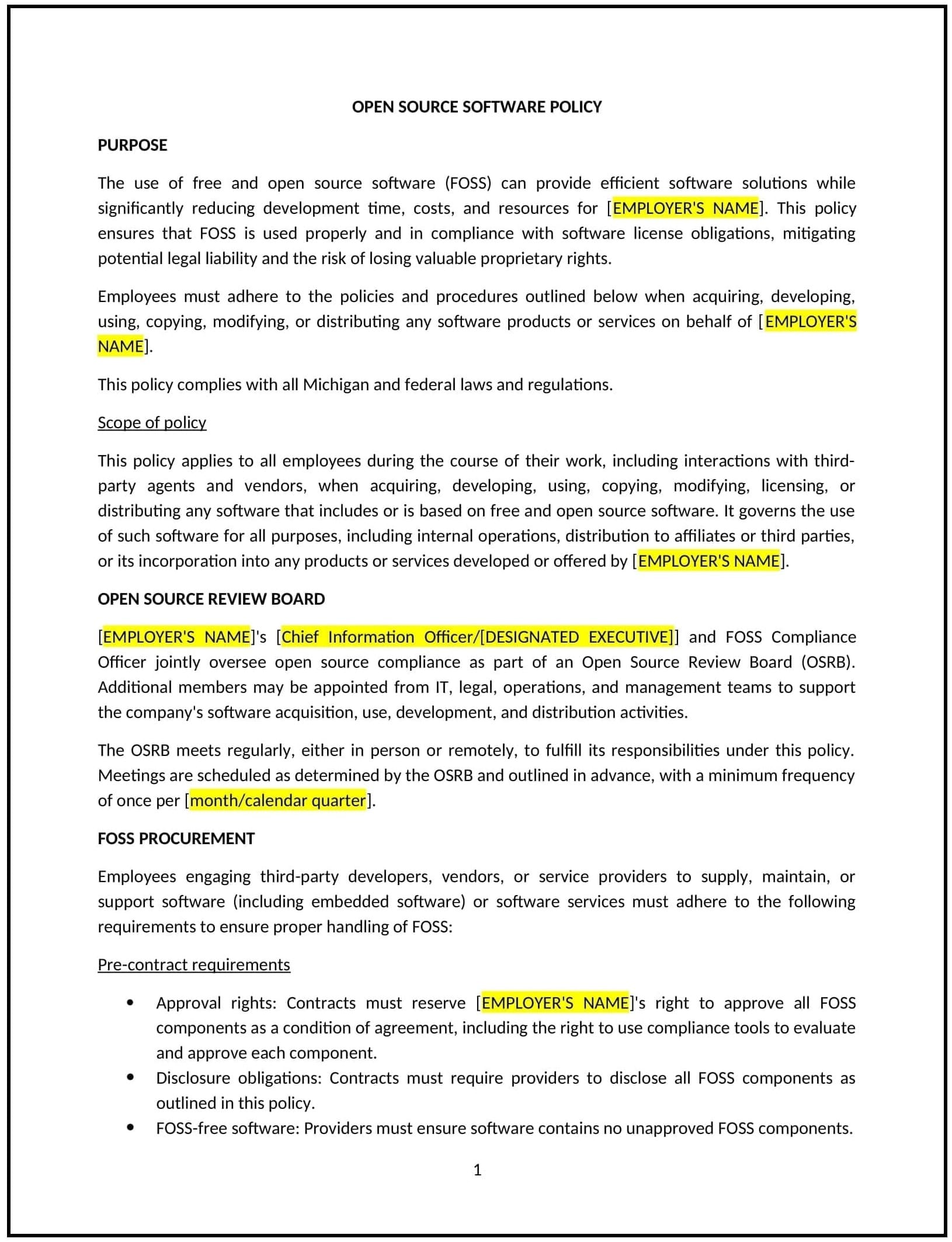Open source software policy (Michigan): Free template
Got contracts to review? While you're here for policies, let Cobrief make contract review effortless—start your free review now.

Customize this template for free
Open source software policy (Michigan)
An open source software policy provides Michigan businesses with guidelines on the use, development, and distribution of open source software (OSS) within the organization. This policy ensures that employees and teams adhere to best practices when using open source tools, contribute to open source projects, and manage licensing issues effectively. It helps businesses leverage the benefits of open source software while mitigating risks related to compliance, security, and intellectual property.
By adopting this policy, businesses can promote a standardized approach to OSS usage, enhance collaboration with the open source community, and reduce the risk of legal and security issues.
How to use this open source software policy (Michigan)
- Define open source software: Clearly define what constitutes open source software, including software that is released under licenses that allow users to view, modify, and distribute the source code. Provide examples of popular open source software used by the business.
- Specify approved licenses: Outline which open source licenses the business allows employees to use or contribute to, such as the MIT License, GPL, or Apache License. Ensure that employees understand the implications of different licenses and how they impact software usage and distribution.
- Establish usage guidelines: Provide guidelines on how employees should use open source software, including the rules for downloading, installing, and integrating OSS with business systems. Ensure that employees understand any restrictions associated with the use of open source software, such as the obligation to attribute authors or share derivative works.
- Address contributing to open source projects: Set expectations for employees who wish to contribute to open source projects. Outline how contributions should be managed, including approval processes, ensuring that no proprietary or confidential business information is inadvertently shared.
- Protect intellectual property: Ensure that employees understand the importance of protecting the business’s intellectual property when working with or contributing to open source software. Employees should not contribute any proprietary code or company-specific developments to open source projects without approval.
- Security considerations: Include guidelines for evaluating and managing the security risks of using open source software. This may involve reviewing the software’s code for vulnerabilities, staying up to date with security patches, and ensuring that OSS is regularly audited for risks.
- Define support and maintenance responsibilities: Clarify who is responsible for supporting and maintaining open source software within the organization. This includes addressing issues related to bug fixes, updates, and any potential security vulnerabilities.
- Monitor compliance: Outline procedures for monitoring compliance with the open source software policy, including regular audits and assessments of OSS usage within the business to ensure that all employees are following the guidelines and legal requirements.
- Review and update regularly: Periodically review and update the policy to reflect changes in open source licensing, emerging best practices, and the business’s evolving software needs.
Benefits of using this open source software policy (Michigan)
This policy provides several key benefits for Michigan businesses:
- Reduces legal and compliance risks: The policy ensures that businesses adhere to the legal obligations associated with open source software, such as compliance with licensing terms and the prevention of unintentional copyright violations.
- Promotes security: By addressing security considerations and encouraging regular audits of open source software, businesses can reduce the risk of vulnerabilities in the software they use, protecting sensitive company data.
- Increases operational efficiency: The policy enables businesses to effectively integrate open source software into their technology stack while ensuring that it is used correctly and efficiently, optimizing both development and operational processes.
- Encourages collaboration: By establishing guidelines for contributing to open source projects, businesses can support collaboration with the global open source community, potentially leading to innovation and fostering positive relationships with other developers.
- Protects intellectual property: The policy ensures that proprietary information is safeguarded and that employees do not inadvertently contribute business-sensitive code to open source projects, protecting the company’s intellectual property.
Tips for using this open source software policy (Michigan)
- Communicate the policy: Ensure that all employees are aware of the open source software policy by including it in the employee handbook, during onboarding, and through periodic reminders or training on best practices for using open source software.
- Offer training for developers: Provide training for developers and technical staff on open source licensing, security best practices, and how to contribute to open source projects responsibly.
- Monitor software usage: Regularly track the use of open source software within the business to ensure compliance with the policy and address any security or licensing issues as they arise.
- Conduct regular security audits: Implement a process for regularly auditing the open source software in use to identify vulnerabilities or outdated versions, and establish a process for addressing any identified risks.
- Encourage ethical contributions: When employees contribute to open source projects, ensure they follow the guidelines for protecting intellectual property and are not sharing any proprietary or confidential business code without prior approval.